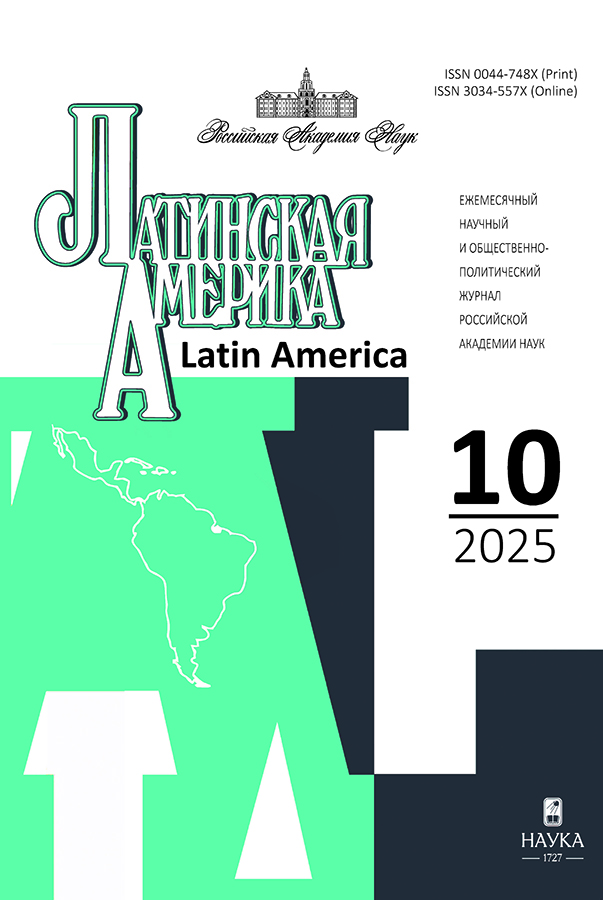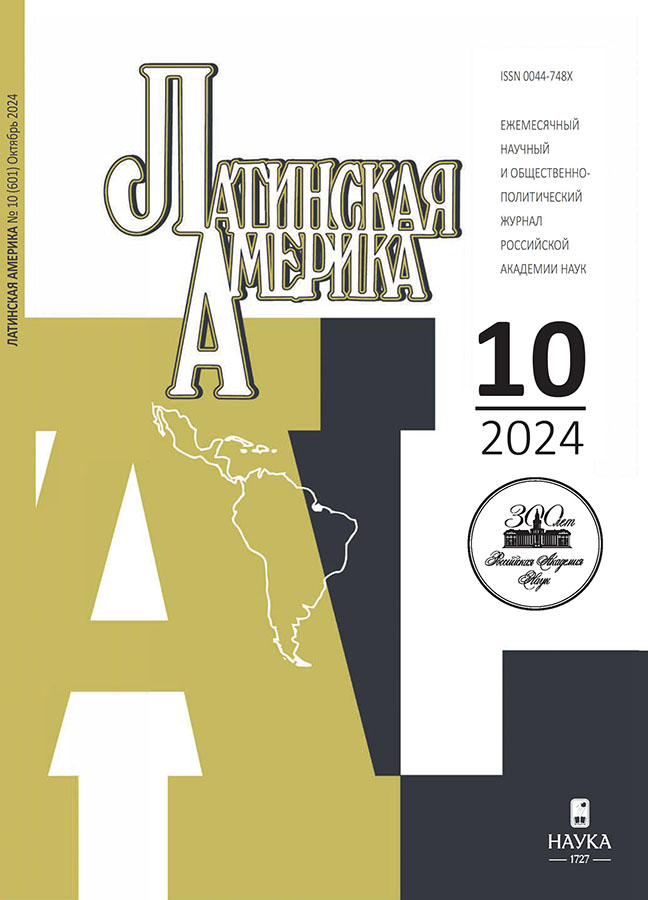Brazil’s new economic policy
- Authors: Simonova L.N1, Ponomarev E.A1
-
Affiliations:
- Center for Economic Research, Institute of Latin America, Russian Academy of Sciences
- Issue: No 10 (2024)
- Pages: 6-20
- Section: Economy
- URL: https://rjmseer.com/0044-748X/article/view/668026
- DOI: https://doi.org/10.31857/S0044748X24100019
- ID: 668026
Cite item
Abstract
The article presents a critical analysis of the main economic programs adopted in Brazil in the first year and a half of Lula da Silva's rule (2023 – the first half of 2024), and which will determine the country's development strategy for the next decade. Particular attention is paid to diagnosing the current state of industry and infrastructure in Brazil, analyzing the causes of deindustrialization, assessing the opportunities and risks of strengthening the role of the state in the modernization of industry and the implementation of large-scale infrastructure projects. The success of new development programs and their geopolitical impact will depend on the effectiveness of public resource management, improved planning and implementation of projects, and increased interaction and control at the federal and sub-regional levels.
About the authors
L. N Simonova
Center for Economic Research, Institute of Latin America, Russian Academy of Sciences
Email: ludmila-simonova@yandex.ru
ORCID iD: 0000-0003-1144-2392
Ph.D. (Economic Sciences), Head Moscow, Russian
E. A Ponomarev
Center for Economic Research, Institute of Latin America, Russian Academy of Sciences
Email: e.samgreen2015@gmail.com
ORCID iD: 0000-0002-8785-0096
Researcher Moscow, Russian
References
- Braziliya: smena prioritetov v novom politicheskom cikle. Otv. red. V.M.Davydov [Brazil: Shifting Priorities in a New Political Cycle. Executive editor V.M. Davydov. The Summit Series]. Moscow, ILA RAN, 2019, 144 p. (In Russ.).
- Brazil must improve rules to lead energy transition. Valor International. November 3, 2023. Available at: https://valorinternational.globo.com/economy/news/2023/11/03/brazil-mustimprove-rules-to-lead-energy-transition.ghtml (accessed 22.01.2024).
- Ferraz Jr. Processo de desindustrialização no Brasil se acentua. Jornal da USP. March 4, 2021. Available at: https://jornal.usp.br/atualidades/processo-de-desindustrializacao-no-brasil-seacentua/ (accessed 17.04.2023).
- Braga de Andrade R. Reversão da desindustrialização é crucial para o Brasil crescer de forma sustentável. Agência de Notícias da Indústria. October 21, 2022. Available at: https://noticias.portaldaindustria.com.br/artigos/robson-braga-de-andrade/reversao-da-desindustrializacao-e-crucial-para-o-brasil-crescer-de-forma-sustentavel/ (accessed 20.04.2023).
- Simonova L.N. Braziliya Luly: ot neoliberal'noj transformacii k nacional'no-orientirovannoj ekonomike. [Lula's Brazil: From Neoliberal Transformation to a Nation-Oriented Economy]. Latinskaya Amerika. Moscow, 2011, N 2, pp. 38-49 (In Russ.).
- Nutenko L.Ya. Promyshlennaya politika Brazilii: kurs na lokalizaciyu i innovacii. [Brazil's Industrial Policy: Focus on Localization and Innovation]. Latinskaya Amerika. Moscow, 2015, N 10, pp. 36-47 (In Russ.).
- Krasil'shchikov V. A. Deindustrializaciya v Brazilii: uroki dlya Rossii. [Deindustrialisation in Brazil: implications for Russia]. Ekonomicheskoe vozrozhdenie Rossii. Moscow, 2018, N 3, pp. 46-62 (In Russ.).
- Building Big - Brazil’s challenges and opportunities in infrastructure: A public-private perspective. IADB. Washington, 2019, 25 p. Available at: https://www.idbinvest.org/en/publications/debrief-building-big-brazils-challenges-and-opportunities-infrastructure-public% (accessed 20.04.2023).
- Brazil infrastructure assessment synthesis report. World Bank. Washington, 2022, 132 p. Available at: http://documents.worldbank.org/curated/en/099140006292213309/ P1745440133da50c0a2630ad342de1ac83 (accessed 21.04.2023).
- OECD Economic Surveys: Brazil 2023. OECD Publishing. Paris, 2023, 126 p. Available at: https://www.developmentaid.org/api/frontend/cms/file/2024/03/ocde-estudo-brasil-18dez2023.pdf (accessed 20.01.2024).
- Valor adicionado bruto constante e corrente, segundo os grupos de atividades – 2000- 2021. Sistema de Contas Nacionais. IBGE. Available at: https://www.ibge.gov.br/estatisticas/economicas/industria/9052-sistema-de-contas-nacionaisbrasil.html (accessed 20.04.2023).
- Câmara aprova PL que moderniza parque industrial brasileiro. MDIC, 20 de março, 2024. Available at: https://www.gov.br/mdic/pt-br/assuntos/noticias/2024/marco/camara-aprovapl-que-moderniza-parque-industrial-brasileiro (accessed 22.03.2024).
- Brasil ganha nova política industrial com metas e ações para o desenvolvimento até 2033. MDIC, 22 de janeiro, 2024. Available at: https://www.gov.br/mdic/ptbr/assuntos/noticias/2024/janeiro/brasil-ganha-nova-politica-industrial-com-metas-e-acoes-para-odesenvolvimento-ate-2033 (accessed 22.02.2024).
- Governo reativa conselho que vai construir a nova política industrial. MDIC, 7 de abril, 2023. Available at: https://www.gov.br/mdic/pt-br/assuntos/noticias/2023/abril/governo-reativaconselho-que-vai-construir-a-nova-politica-industrial (accessed 20.04.2023).
- Nova Indústria Brasil, Plano de Ação para a Neoindustrialização 2024-2026. MDIC, 2024, 106 p. Available at: https://www.gov.br/mdic/pt-br/composicao/se/cndi/plano-de-acao/novaindustria-brasil-plano-de-acao.pdf (accessed 22.03.2024).
- Bases para o desenvolvimento: indústria, comércio e serviços. MDIC, 21 de dezembro, 2023. Available at: https://www.gov.br/mdic/pt-br/assuntos/noticias/2023/dezembro/2023-construidas-as-bases-para-a-neoindustrializacao-do-pais (accessed 20.01.2024).
- O que é fato e o que é fake sobre a Nova Indústria Brasil, o programa de política industrial do país. MDIC, 26 de janeiro, 2024. Available at: https://www.gov.br/mdic/ptbr/assuntos/noticias/2024/janeiro/o-que-e-fato-e-o-que-e-fake-sobre-a-nova-industria-brasil-oprograma-de-politica-industrial-do-pais (accessed 17.02.2024).
- "NOVO PAC" is to invest BRL 1.7 trillion across all Brazilian states. Governo Federal do Brasil, August 16, 2023. Available at: https://www.gov.br/planalto/en/latestnews/2023/08/novo-pac-is-to-invest-brl-1-7-trillion-across-all-brazilian-states (accessed 22.12.2023).
- Brazil to invest $347.5B to boost infrastructure, ecology. The NRI Nation. August 12, 2023. Available at: https://www.mynrination.com/brazil/2023/08/12/brazil-to-invest-3475b-toboost-infrastructure-ecology (accessed 20.12.2023).
- The Brazil of the Future. Towards Productivity, Inclusion, and Sustainability. World Bank. Washington, 2023, 239 p. Available at: https://documents1.worldbank.org/curated/en/099103023102519369/pdf/P1734580f965110a70b8170111b063da3ba.pdf (accessed 20.01.2024).
- Brazil plans to spend US$33bn on power infrastructure as part of its new PAC. Enerdata. August 28, 2023. Available at: https://www.enerdata.net/publications/daily-energynews/brazil-plans-spend-us33bn-power-infrastructure-part-its-new-pac.html (accessed 20.12.2023).
- Apresentação Novo PAC Desenvolvimento e Sustentabilidade. Governo Federal do Brasil. Brasilia, 2023. Available at: https://www.gov.br/planalto/pt-br/acompanhe-oplanalto/noticias/2023/09/alckmin-brasil-vive-bom-momento-e-tem-grandes-oportunidades-paraatrair-investimentos-com-o-novo-pac/apresentacao_pac_portugues.pdf (accessed 20.01.2024).
Supplementary files










